Dell XPS 15 Haswell Edition: QHD+ with a Refined Design
by Jarred Walton on March 6, 2014 7:00 AM ESTDell XPS 15: General Performance
With all the talk of potential throttling, some of you might be concerned with general performance – and again, let me reiterate that a reboot appears to clear the problem, so hopefully Dell’s engineering time can track down the root cause in the coming days/weeks and fix it. Even if they can’t/don’t, the reality is that in most cases the throttling is a complete non-issue. PCMark and other tests that hit the CPU never showed any problems, and even most of the other graphics testing that I ran didn’t have problems. Of course, with a reboot apparently being a workaround, that’s not too surprising.
As you would expect from the hardware, the high-end model of the XPS 15 that we’re testing runs plenty fast and should satisfy anyone short of extreme performance types. If you want more CPU power in a laptop, you’ll basically need to get something quite a bit thicker and heavier, and even then the top model i7-4930MX/4940MX are only about 25% faster in practice (4.0GHz maximum Turbo Boost vs. 3.2GHz). The 512GB SSD also helps keep things running smoothly, 16GB RAM should be sufficient for quite some time (outside of perhaps running lots of VMs or a few other specific workloads), and when needed the GT 750M is waiting in the background to help with graphics/compute tasks. Here’s a look at our general performance testing results, which have been updated to use the latest versions of 3DMark11, 3DMark (2013), PCMark7, and PCMark8 along with Cinebench 11.5 and x264 HD 5. PCMark8 v2 scores are not (entirely) comparable with the earlier release, so for now we only have this one system tested, but that will change in time.
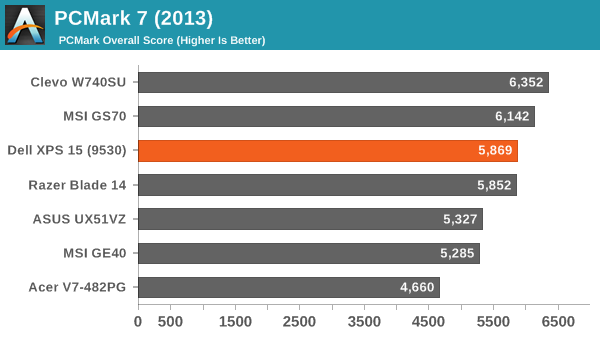
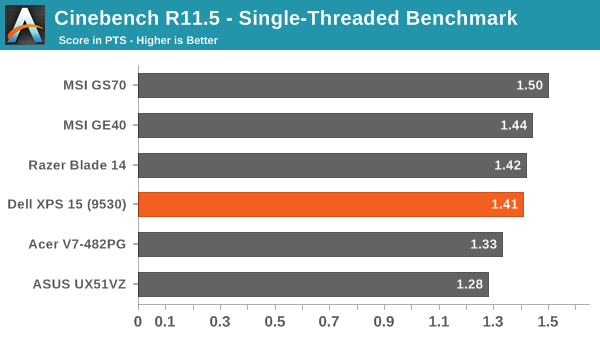
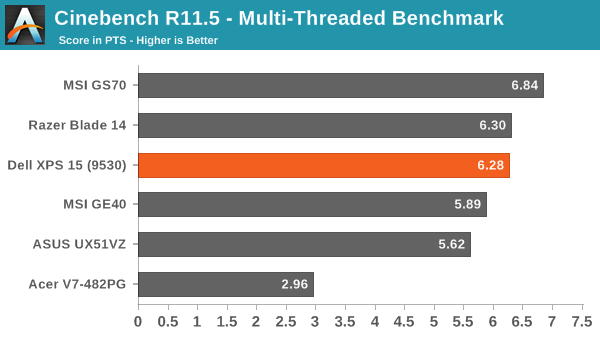
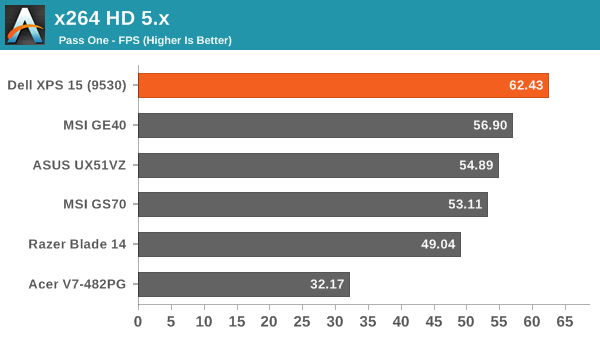
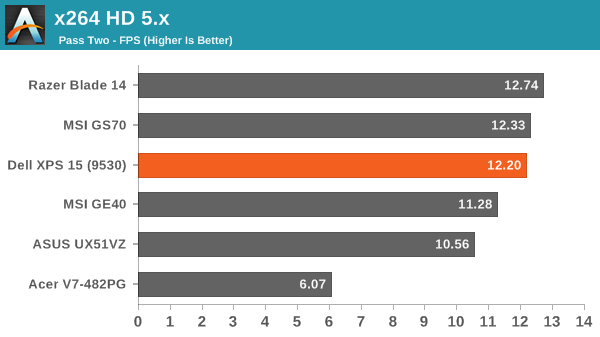
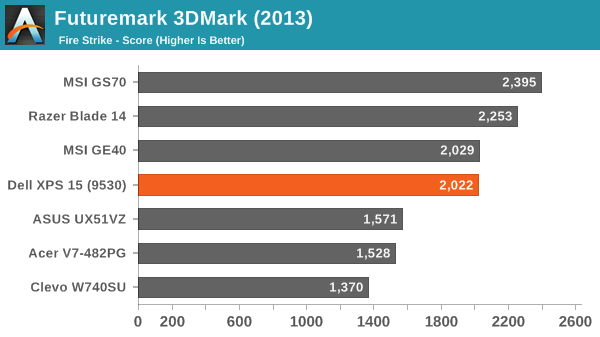
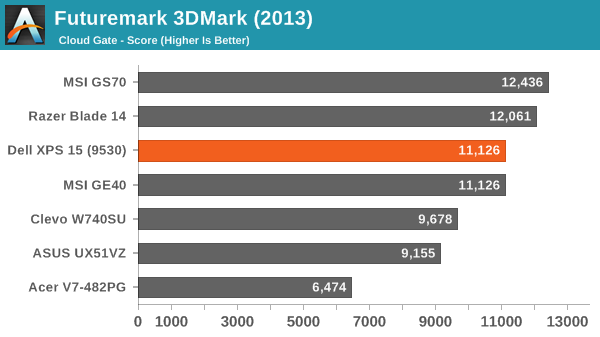
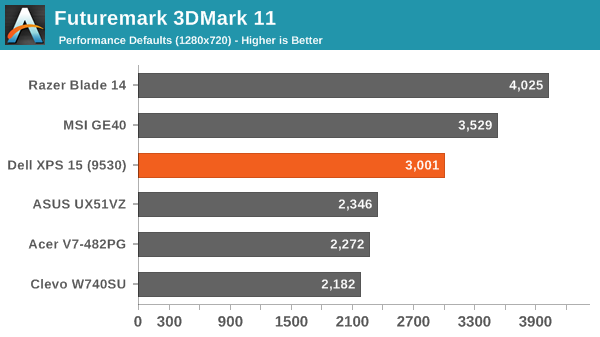
There’s really not much to say about overall performance. The new Dell XPS 15 may not be the absolute fastest laptop around, but it’s certainly a capable offering that can handle any reasonable load most users might want to run. If you need more performance, you likely knew before even looking at these graphs that that would be the case. As a premium consumer/business laptop, I know plenty of people that would be quite please to have one of these to tote around.










152 Comments
View All Comments
oleguy682 - Thursday, March 6, 2014 - link
I understand the desire for 16:10 in place of 16:9. But if both are 1800 lines, do you really notice the missing 200 pixels at the bottom? I realize that the AR will resize a displayed window slightly, but it would be interesting to see the actual difference between what is displayed on 16:10 vs. 16:9 on a similar document or webpage that is scaled appropriately for the AR. Unfortunately my 4:3 screen only will give me a 16:10 or 5:3 (16:9.6 or so) AR so I can't really make the comparisons myself.Fox5 - Thursday, March 6, 2014 - link
I had this laptop. I actually had a hell of a time with the intermittent throttling. Believe it or not, it happens fastest and most often with simpler games. Also, I had heavy display corruption with Steam Big Picture mode when using the nvidia gpu.Dell eventually fixed the throttling by replacing the heatsink and fan assembly. It's a tiny piece of hardware too. The corruption in Big Picture mode is still there though.
Silma - Thursday, March 6, 2014 - link
I haven't had any throttling issue since november but then again I'm not using it to play.unni - Thursday, March 6, 2014 - link
If you keep it on a level surface, there doesn't seem to be any throttling. Also, try nVidia inspector and set FPS to 30. That helps as well.Fox5 - Sunday, March 9, 2014 - link
Lol, locking the fps to 30 shouldn't be required. Also, the level surface did nothing for it. I had a legitimately defective model, and replacing the heatsink fixed it.whyso - Thursday, March 6, 2014 - link
Good that they fixed the throttling. I had a 2nd gen model that would idle at 60 degrees and reach over 100 degrees on games like skyrim.Interesting to see that the 750m performs very closely to the 765m in the razer blade.
Also, would it be possible to do some sort of test to see if the PCI-E SSD in the mac lineup actually brings any advantages? Random performance isn't better than anything else out there. Copying files to anything other than a SSD won't be different. The Macbook air reviewed didn't boot up any faster than the 2012 model either. What exactly are the advantages and are they even apparent?
VisionX302 - Thursday, March 6, 2014 - link
I tested the performance of both of these. The Mac was around 1 Gb/s while the Dell was in the 500 Mb/s range. For most real-life activities you wouldn't notice a big difference, but I could a difference in copying files, booting, resuming from sleep, etc.tipoo - Thursday, March 6, 2014 - link
I wonder if it's the same issue, my Studio 15 after some days/hours use would always lock itself at the minimum clock multiplier, had to reset to fix it. I could also fix it through forcing multipliers through Throttlestop, which was also good for me since on Penryn processors they could be undervolted so much that the top clock could use the bottom clocks voltage.tipoo - Thursday, March 13, 2014 - link
And do the larger battery sizes change the size (do they jut out like older models) and how much do they change the weight?superflex - Thursday, March 6, 2014 - link
Jarred,Why make the comparison to the retina MBP in the intro if you dont provide a comparison to the MBP in the charts?
Full retard, baby.